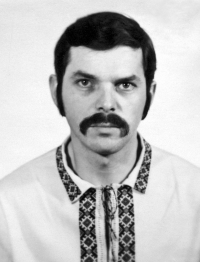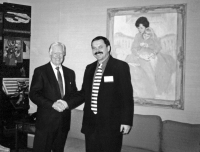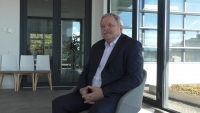At the turn of the 76th year, in March of the 76th year, we organized for the KGB our last farewell action of disobedience. It took place at Shevchenko's poetry night, in the Kyiv Philharmonic, which we attended being well aware that the 76th year is a frenzy of Brezhnev ideology, and there will be nothing Ukrainian there. But we went there, the hall of the Philharmonic was full because people were still thirsty for something like that. Well, the evening begins with the speech of Mykola Shamota, he is... still a Ukrainian, but also a turncoat, as they say. He is a literary critic, and he made a speech about Shevchenko, but it was actually a speech about Lenin, describing how Lenin respected Shevchenko, and that he even went to Shevchenko's poetry night in Krakow even though the event was a bit nationalistic, and so on and so forth. Then the concert began, which had a very interesting pattern: no poem or song based on Shevchenko's words in Ukrainian. When singing songs - singing only Ukrainian folk songs, when reciting Shevchenko's poetry - only in Russian from Shevchenko's "Dnievnik (The Diary)" because he wrote it in Russian. That is, these quotations were read, but in Russian because that's how it was written in the original. So... When the intermission started, Mykola and I agreed that, since we knew that it would be like this until the end, we agreed on making a demonstration. Then it really was like that until the end, at the end they sang a song, I don't remember which one, people chanted "Za-po-vit, Za-po-vit" (Tes-ta-ment, Tes-ta-ment). They then announce a song about the party that shocked people in general, and that was all, the concert was over, they said in Ukrainian: the concert is over, disperse. Well, people started going out, then, as we agreed, I jumped on stage, went to the microphone and told people: Stop. And I started saying something like this: we have heard from our lecturer today at the beginning that Lenin respected… Respected Taras Shevchenko, and at the same time we must remember that Lenin loved not only Beethoven's "Appassionata", but also Shevchenko's "Testament." So, let's sing Shevchenko's "Testament" [cheerfully]. And people at once, I saw them in the front rows, started smiling [laughs] from ear to ear, everyone understood that turn of events, and nodded - yes-yes-yes. The piano was in the middle of the stage, I approached the piano and wanted to take the first chord to sing the Testament. A woman runs up to me and just hissed so softly: Stop right now! And she turned to the people: The concert is over! The concert is over! And she kept my hands from the piano and didn’t let me take the chord. Well, I wouldn't fight with a woman on the stage [laughs], so then I got up, shrugged my shoulders, and… I couldn't do anything else, but then Mykola jumped on the stage. He came to the microphone and the first thing he said was "People, aren't you ashamed?" And the audience answered: "We are ashamed" [laughs]. Well, then we realized that we had the audience's support, we jumped off the stage, we were surrounded by people, we started singing "Testament", and all the people in the audience began to sing. And those others they run, shouted, no one heard them. Then what they did - they started flashing light. We did not react and continued singing. Then they turned off the lights altogether. And that was a huge psychological mistake because when the whole audience was singing "Testament" in the dark hall it sounded colossal, it was such an experience, you know, to sing that loud "Testament" in darkness.




